articles
-
Each outcome is another opportunity
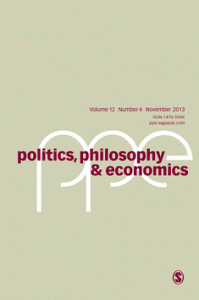 Politics, Philosophy and Economics (PPE) Vol. 8 No. 4 (2009).
Politics, Philosophy and Economics (PPE) Vol. 8 No. 4 (2009).This paper introduces the concept of a Moment of Equal Opportunity (MEO): a point in an individual’s life at which equal opportunity must be applied and after which it need not. The concept of equal opportunity takes many forms, and not all employ an MEO. However, the more egalitarian a theory of equal opportunity is, the more likely it is to use an MEO. The paper discusses various theories of equal opportunity and argues that those that employ an MEO are problematic. Unjust inequalities, those that motivate the use of equal opportunity, occur throughout peoples’ lives and thus go unrectified after an MEO. However, it is not possible to abandon the MEO approach and apply more egalitarian versions of equal opportunity throughout a person’s life since doing so entails problems of epistemology, efficiency, incentives and counter-intuitive results. The paper thus argues that liberal egalitarian theories of equality of opportunity are inconsistent if they support an MEO and unrealisable if they do not.
You can read this paper here.
-
Coercive redistribution and public agreement: re-evaluating the libertarian challenge of charity
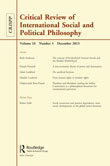 (with Phil Parvin) in Matt Matravers and Lukas Meyer (eds.), Democracy, Equality, and Justice (Routledge and special issue of Critical Review of International Social and Political Philosophy (CRISPP) Vol. 13 No. 1 (2010).
(with Phil Parvin) in Matt Matravers and Lukas Meyer (eds.), Democracy, Equality, and Justice (Routledge and special issue of Critical Review of International Social and Political Philosophy (CRISPP) Vol. 13 No. 1 (2010).
In this article, we evaluate the capacity of liberal egalitarianism to rebut what we call the libertarian challenge of charity. This challenge states that coercive redistributive taxation is neither needed nor justified, since those who endorse redistribution can give charitably, and those who do not endorse redistribution cannot justifiably be coerced. We argue that contemporary developments in liberal political thought render liberalism more vulnerable to this libertarian challenge.
Many liberals have, in recent years, sought to recast liberalism such that it is more hospitable to cultural, religious, and ethnic diversity. This move has resulted in increased support for the claim that liberalism should be understood as a political rather than comprehensive doctrine, and that liberal institutions should draw their legitimacy from agreements made among members of an appropriately conceived deliberative community, rather than from controversial liberal principles like individual autonomy. We argue that, while this move may indeed make liberalism more compatible with cultural diversity, it also makes it more vulnerable to the libertarian challenge of charity. Not all versions of liberalism are troubled by the challenge, but those that are troubled by it are increasingly dominant.
We also discuss G.A. Cohen’s claim that liberal equality requires an ‘egalitarian ethos’ and argue that, if Cohen is right, it is difficult to see how there can be an adequate response to the libertarian challenge of charity. In general, our argument can be summarised as follows: the more that liberalism is concerned accurately to model the actual democratic wishes and motivations of the people it governs, the less it is able to justify coercively imposing redistributive principles of justice.
You can read a copy of this paper here.
-
Inclusivity and the constitution of the family
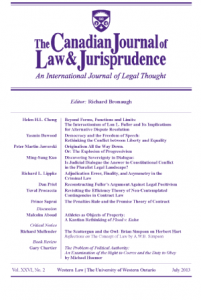 Canadian Journal of Law and Jurisprudence (2009, 1).
Canadian Journal of Law and Jurisprudence (2009, 1).This article responds to Alan Brudner’s Constitutional Goods. It argues that Brudner’s concept of liberal inclusivity is problematic both conceptually and normatively, and results in policies on marriage and abortion that liberals would not accept. Issue No. 2 includes a response from Brudner.
-
Torture as an evil: Response to Claudia Card
 Criminal Law and Philosophy Vol. 2 No. 1 (January 2008).
Criminal Law and Philosophy Vol. 2 No. 1 (January 2008).This article argues that, while Claudia Card is right to reject proffered excuses for torture, her strategy for demonstrating that torture is an evil and thus inexcusable is problematic. You can read the paper here.
-
Masculine domination, radical feminism and change
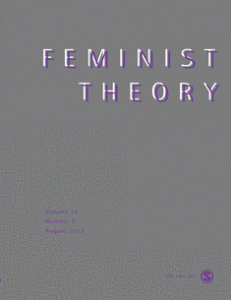 Feminist Theory Vol. 6 No. 3 (December 2005).
Feminist Theory Vol. 6 No. 3 (December 2005).This article argues that the feminist turn to Pierre Bourdieu in an attempt to conceptualise the tension between freedom and agency is helpful, but is made more so when the similarities between the work of Bourdieu and radical feminist Catharine MacKinnon are noticed. MacKinnon’s strategies for change, particularly consciousness-raising, are well suited to a Bourdieuean approach.
You can read the paper here.
-
Autonomy and equality in cultural perspective: Response to Sawitri Saharso
 Feminist Theory Vol. 5 No. 3 (December 2004).
Feminist Theory Vol. 5 No. 3 (December 2004).This paper criticises Sawitri Saharso’s argument that hymen repair surgery and sex-selective abortion can be both multiculturalist and feminist policies.
You can read the paper here.
-
Are breast implants better than female genital mutilation? Autonomy, gender equality and Nussbaum’s political liberalism
 Critical Review of International Social and Political Philosophy (CRISPP) Vol. 7 No. 3 (Autumn 2004).
Critical Review of International Social and Political Philosophy (CRISPP) Vol. 7 No. 3 (Autumn 2004).This paper outlines two forms of autonomy, and argues that political liberals such as Martha Nussbaum wrongly prioritise second-order autonomy. As a result, they cannot provide adequate criticism of unjust social norms. The two cases of breast implants and female genital mutilation are compared to illustrate this point.
-
Nation-building, Neutrality and Ethnocultural Justice: Kymlicka’s ‘Liberal Pluralism’
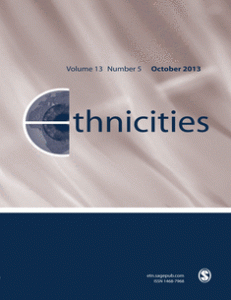 Ethnicities Vol. 3 No. 3 (September 2003).
Ethnicities Vol. 3 No. 3 (September 2003).This paper takes issue with Will Kymlicka’s arguments on ethnocultural justice. It argues that liberal nation-building is not the same thing as minority nation-building, and that the former need not cause injustice to minority ethnocultural groups.
You can read the paper here.